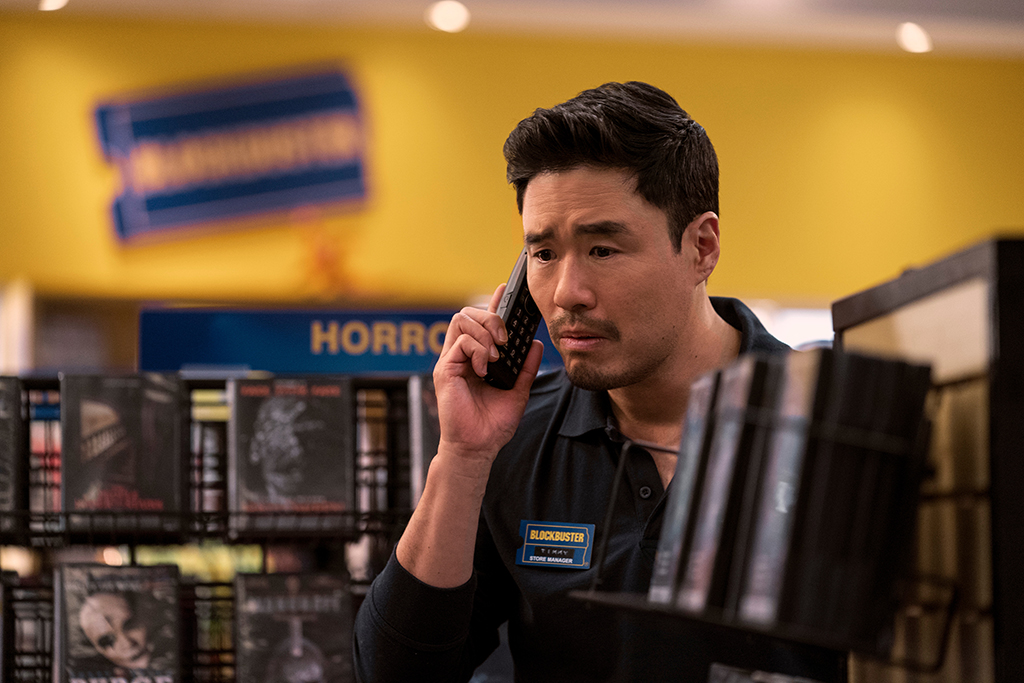By Kai Curry
Northwest Asian Weekly

Netflix released its new comedy TV series, “Blockbuster,” on Nov 3. It was ranked number seven in TV shows on the streaming service over its release weekend—although I’d attribute a lot of that to newness.
Everybody tries out everything on Netflix at least once, I’d say. Not sure how many tries the audience will give “Blockbuster”—based on the real story of the last Blockbuster store in the world—but it does offer a glimpse into that movie rental culture and has some laughs.
You might be a little confused at first (or more than once) as to which retail sitcom you’re watching. I was convinced Melissa Fumero was in “Superstore” until I remembered it’s “Brooklyn Nine-Nine.” The humor is akin to “Superstore,” and Fumero’s character, Eliza, has a similar vibe as America Ferrera, and a parallel relationship with the boss, Timmy, played by Randall Park, that Ferrera’s character has with Glen in “Superstore.” (Or that Amy, the good girl, has with Jake, the goof, in “Brooklyn Nine-Nine,” wow, I’m all mixed up!)
In both cases, the boss is the floundering guy with a good heart and the woman, here Fumero, plays his stoic sidekick. There’s an additional romantic angle in “Blockbuster,” but other parts ring familiar bells, too, such as Carlos (Tyler Alvarez), who might remind you of “Superstore’s” Jonah. Both also represent Latin culture, as does Olga Meridez as Connie, who introduces everyone to Dia de los Muertos by putting up a shrine in the store, cuz that happens. Rules are off here in a world where the last Blockbuster store is trying to stay afloat, whatever it takes.
None of this is to say any of the above is a problem. If you like “Superstore” and “Brooklyn Nine-Nine,” which I actually do, then “Blockbuster” might appeal. For me, it’s an appeal that doesn’t mean I’m going to binge on it, but means I will tune in for a light watch now and again and the occasional giggle. Park is very funny as just another corporate cog turned small business owner overnight—yet I have to say again that his delivery echoes another character—him in “Always Be My Maybe,” right down to being the “guy who can’t get over high school.” Which is also fine. Park was adorable in that movie and he’s cute and funny now, too, with the way he scrunches up his face after he just made a joke about something he’s actually sad about.
The real Blockbuster chain started in the mid-1980s and had thousands of stores by the 2000s, not just in the United States but around the world. When Netflix got the idea of mailing people movies (bet you haven’t thought of that for a while! Or never!), Blockbuster tried to compete, but couldn’t separate from the way people thought of it, and rightfully so, as an in-person experience. Still, it had a good run, and didn’t dwindle down to just one remaining store until 2019.

Blockbuster. Randall Park as Timmy in episode 101 of Blockbuster. Cr. Ricardo Hubbs/Netflix © 2022
Maybe the reason I’m obsessively comparing “Blockbuster” to other shows is that, within a few episodes, it so successfully evoked that world to me—of renting movies and games, way before Netflix even existed (that’s ironic!)—that I have turned into an employee, whose job was (is) to recommend movies to customers by basically saying, “if you liked this, then…” So kudos to the show, which convincingly brings back that culture and that era. If you were there (raises hand), you will get an occasional jolt of nostalgia. If you weren’t, it might be like asking your kid to use a Walkman. I just don’t know if anyone who didn’t live through it will care. It’s weird though, because the last remaining Blockbuster, which for real is in Bend, Oregon (road trip!), is in Montana in the show. Hearing them reference TikTok, memes, and Instagram, while surrounded by the telltale blue and yellow signage is jarring yet, likely legit. It’s just two worlds you never imagined clashing, and that’s why all the other stores are gone.
The pilot of “Blockbuster” starts strong with a message of small business holding out against corporate giants (even though they originally were one), and of the importance of face-to-face contact in an internet world. By the second episode, the show is more about relationships than the store—though the struggle to keep it running continues. It’s my hope that the show was made with love and that someone in the cast or crew does personally remember those days, when yes, customers did browse the aisles reading DVD covers (but first, VHS!), and really did go up to employees asking their opinions on what they should watch next. There really were regulars and as odd as it might seem now, there really was a warm and cozy feeling walking in the door.
The love of movies was something you knew for a fact you shared with everyone in the room; not the kind of abstract assurance we have now that sure, X amount of people also watched “The Avengers”—cuz the internet told us so. Believe me, it does not feel the same.
Timmy’s speech in the pilot episode is worth cutting and splicing here.
“We, as a society, have lost something huge. Each other….even renting a movie, used to be our chance to interact with a familiar face. But big corporations…stole that…you can’t replace getting to know a person with a computer program, or the smile of a stranger with a smiling box.”
Kai can be reached at info@nwasianweekly.com.



